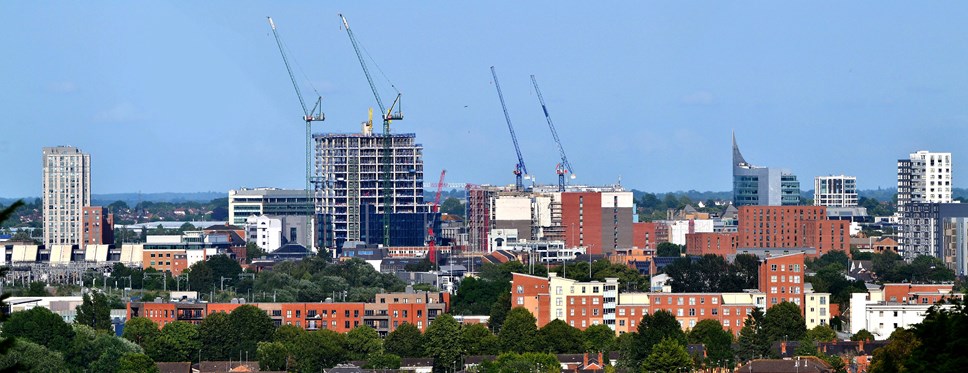
Council Frustrated in Bid to Tackle Sub-Standard Homes
- Council planning policy aimed at reducing the number of sub-standard homes in Reading now covers only 21% of the scheme's original area after a Government ruling
- Permitted Development Rights can lead to residents moving into areas that are unsuitable as places to live, due to noise, disturbance and air quality issues
THE Council has been frustrated in its bid to block the use of planning laws which allow developers to by-pass the planning application system and build sub-standard homes, after the Government confirmed it was substantially watering down local proposals to help tackle the issue in Reading.
Just over a year ago, Reading Borough Council introduced what is known as an ‘Article 4 Direction’ in parts of the town to prevent certain permitted development rights (PDR) going ahead without consultation with neighbours and the local planning authority.
Whilst recognising the vital importance of delivering new homes, the Council strongly opposes the use of these types of PDR. They can lead to residents moving into areas that are an unsuitable place to live, due to noise, disturbance and air quality issues. Offices to flat conversions are often substandard with little or no outdoor space and are almost exclusively one bedroom or studio, ignoring the desperate need in Reading for larger family-sized homes.
Since their introduction in 2013, PDR is estimated to have cost the town nearly 600 new affordable homes along with the loss of at least £3.5 million in off-site contributions to affordable housing. Around £4 million in planning fees and education, leisure and transport contributions, have also been lost.
The Council’s Article 4 direction blocked commercial to residential conversions without planning permission in many parts of Reading and prevented adding residential storeys onto commercial buildings and demolishing commercial buildings and rebuilding them as residential units, without the local planning authority approving the plans. It applied to the town centre, district and local centres, core employment areas and other primarily commercial locations, as well as areas of poorest air quality.
The policy was always potentially subject to modification or cancellation by the Secretary of State however, and since making the Direction in November 2021 and introducing it the following year, the Council has been in negotiation with the DLUHC (Department for Levelling Up, Housing and Communities). The Council initially reduced the area covered by the Direction by 77% as a direct response to concerns expressed by the DLUHC. Government officials then returned requesting further evidence, in particular relating to air quality and noise, which was subsequently provided by the Council.
This summer the then Minister of State for Housing and Planning, Rachel Maclean, wrote to the Council saying she was minded modify or cancel the Article 4 Direction unless even more sites were excluded, namely where their inclusion was justified by noise and /or air quality issues alone. This modification was formally confirmed by the Secretary of State on October 10th.
It means the modified Article 4 direction covers only 21% of the area of the original. It also means the area which now remains covered by the Direction almost exclusively comprises of the main town centre shopping streets; the most significant frontages in district and local centres; and core employment areas which contain relevant office and light industrial uses. Nevertheless, it does still mean that Reading has managed to protect more of its areas than many other authorities that have put such directions in place.
The modification of the Article 4 Direction, and its likely impact on Reading, is set to be discussed at the next meeting of the Council’s Policy Committee on Wednesday December 13. The Committee report can be found at https://democracy.reading.gov.uk/documents/s29493/Article%204%20modification%20Policy%20Committee%20report%20December%202023.pdf
Councillor Micky Leng, Reading Council’s Lead for Planning, said:
“While it’s fair to say confirmation of this major modification by the Secretary of State was not unexpected, given our knowledge of the ongoing negotiation with Government, that’s not to say it is not hugely disappointing.
“Reading residents will know first-hand the detrimental impact poorly converted bedsits and one-bedroom flats have on local communities. They are often crammed into completely unsuitable locations and the poor people who are forced to live in them have to contend with disturbance, noise and poor air quality because of where they are located.
“For the Secretary of State to further modify the Article 4 Direction to specifically exclude areas which were justified by poor air quality and / or noise is hugely unjust and has effectively diluted down a local planning policy introduced by a local Council doing its best to protect the local communities and residents it is responsible for.
"At one million square metres of land, the Council has still managed to protect more of its areas, including core employment areas, than many other councils who have put similar directions in place, but we remain disappointed at the outcome.
“It remains essential that the correct planning framework is in place nationally to enable local councils to keep an overview of local planning decisions. Councils must retain the ability to insist that developers build suitable homes and make an appropriate contribution to local infrastructure and affordable housing, as opposed to solely increasing their profit margins at our expense.”

